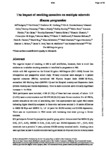The impact of smoking cessation on multiple sclerosis disease progression
| dc.contributor.author | Rodgers, J | |
| dc.contributor.author | Friede, T | |
| dc.contributor.author | Vonberg, FW | |
| dc.contributor.author | Constantinescu, CS | |
| dc.contributor.author | Coles, A | |
| dc.contributor.author | Chataway, J | |
| dc.contributor.author | Duddy, M | |
| dc.contributor.author | Emsley, H | |
| dc.contributor.author | Ford, H | |
| dc.contributor.author | Fisniku, L | |
| dc.contributor.author | Galea, I | |
| dc.contributor.author | Harrower, T | |
| dc.contributor.author | Hobart, J | |
| dc.contributor.author | Huseyin, H | |
| dc.contributor.author | Kipps, CM | |
| dc.contributor.author | Marta, M | |
| dc.contributor.author | McDonnell, GV | |
| dc.contributor.author | McLean, B | |
| dc.contributor.author | Pearson, OR | |
| dc.contributor.author | Rog, D | |
| dc.contributor.author | Schmierer, K | |
| dc.contributor.author | Sharrack, B | |
| dc.contributor.author | Straukiene, A | |
| dc.contributor.author | Wilson, HC | |
| dc.contributor.author | Ford, DV | |
| dc.contributor.author | Middleton, RM | |
| dc.contributor.author | Nicholas, R | |
| dc.date.accessioned | 2022-03-04T10:35:56Z | |
| dc.date.issued | 2021-10-08 | |
| dc.identifier.issn | 0006-8950 | |
| dc.identifier.issn | 1460-2156 | |
| dc.identifier.uri | http://hdl.handle.net/10026.1/18884 | |
| dc.description.abstract |
<jats:title>Abstract</jats:title> <jats:p>The negative impact of smoking in MS is well established, however, there is much less evidence as to whether smoking cessation is beneficial to progression in MS.</jats:p> <jats:p>Adults with MS registered on the United Kingdom MS Register (2011-2020) formed this retrospective and prospective cohort study. Primary outcomes were changes in 3 patient reported outcomes (PROs): normalised MS Physical Impact Scale (MSIS-29-Phys), normalised MS Walking Scale (MSWS-12) and the Hospital Anxiety and Depression Scale (HADS-Anxiety and HADS-Depression). Time to event outcomes were clinically significant increases in the PROs.</jats:p> <jats:p>7983 participants were included, 4130 (51.7%) of these had ever smoked; of whom 1315 (16.5%) were current smokers and 2815/4130 (68.2%) were former smokers. For all PROs, current smokers at the time of completing their first questionnaire had higher PRO scores indicating higher disability compared to those who had never smoked (∼10 points difference in MSIS-29-Phys and MSWS-12; 1.5-1.8 point for HADS-anxiety and HADS-depression). There was no improvement in PRO scores with increasing time since quitting in former smokers.</jats:p> <jats:p>923 participants formed the prospective parallel group, which demonstrated that MSIS-29-phy 5.03, [3.71, 6.34], MSWS-12 5.28, [3.62, 6.94] and HADS-depression 0.71, [0.47, 0.96] worsened over a period of 4 years, whereas HADS-anxiety remained stable. Smoking status was significant at year 4; current smokers had higher MSIS-29-Phys and HADS-Anxiety scores (3.05 [0.22, 5.88], 1.14 [0.52,1.76]) while former smokers had a lower MSIS-29 score of -2.91[-5.03, -0.79].</jats:p> <jats:p>4642 participants comprised the time to event analysis. Still smoking was associated with a shorter time to worsening event in all PROs (MSIS-29-Phys: n = 4436, p = 0.0013; MSWS-12: n = 3902, p = 0.0061; HADS-anxiety: n = 4511, p = 0.0017; HADS-depression: n = 4511, p &lt; 0.0001). Worsening in motor disability (MSIS-29-Phys and MSWS-12) was independent of baseline HADS-anxiety and HADS-depression scores. There was no statistically significant difference in the rate of worsening between never and former smokers.</jats:p> <jats:p>When smokers quit, there is a slowing in the rate of motor disability deterioration so that it matches the rate of motor decline in those who have never smoked. This suggests that smoking cessation is beneficial for people with MS.</jats:p> | |
| dc.format.extent | 1368-1378 | |
| dc.format.medium | ||
| dc.language | en | |
| dc.language.iso | en | |
| dc.publisher | Oxford University Press (OUP) | |
| dc.subject | multiple sclerosis | |
| dc.subject | public health | |
| dc.subject | epidemiology | |
| dc.title | The impact of smoking cessation on multiple sclerosis disease progression | |
| dc.type | journal-article | |
| dc.type | Journal Article | |
| dc.type | Research Support, Non-U.S. Gov't | |
| plymouth.author-url | https://www.webofscience.com/api/gateway?GWVersion=2&SrcApp=PARTNER_APP&SrcAuth=LinksAMR&KeyUT=WOS:000784739900001&DestLinkType=FullRecord&DestApp=ALL_WOS&UsrCustomerID=11bb513d99f797142bcfeffcc58ea008 | |
| plymouth.issue | 4 | |
| plymouth.volume | 145 | |
| plymouth.publication-status | Published | |
| plymouth.journal | Brain | |
| dc.identifier.doi | 10.1093/brain/awab385 | |
| plymouth.organisational-group | /Plymouth | |
| plymouth.organisational-group | /Plymouth/Faculty of Health | |
| plymouth.organisational-group | /Plymouth/Faculty of Health/Peninsula Medical School | |
| plymouth.organisational-group | /Plymouth/REF 2021 Researchers by UoA | |
| plymouth.organisational-group | /Plymouth/REF 2021 Researchers by UoA/UoA03 Allied Health Professions, Dentistry, Nursing and Pharmacy | |
| plymouth.organisational-group | /Plymouth/Research Groups | |
| plymouth.organisational-group | /Plymouth/Research Groups/Institute of Translational and Stratified Medicine (ITSMED) | |
| plymouth.organisational-group | /Plymouth/Research Groups/Institute of Translational and Stratified Medicine (ITSMED)/CCT&PS | |
| plymouth.organisational-group | /Plymouth/Users by role | |
| plymouth.organisational-group | /Plymouth/Users by role/Academics | |
| dc.publisher.place | England | |
| dcterms.dateAccepted | 2021-09-28 | |
| dc.rights.embargodate | 2022-3-5 | |
| dc.identifier.eissn | 1460-2156 | |
| dc.rights.embargoperiod | Not known | |
| rioxxterms.versionofrecord | 10.1093/brain/awab385 | |
| rioxxterms.licenseref.uri | http://www.rioxx.net/licenses/all-rights-reserved | |
| rioxxterms.licenseref.startdate | 2021-10-08 | |
| rioxxterms.type | Journal Article/Review |


